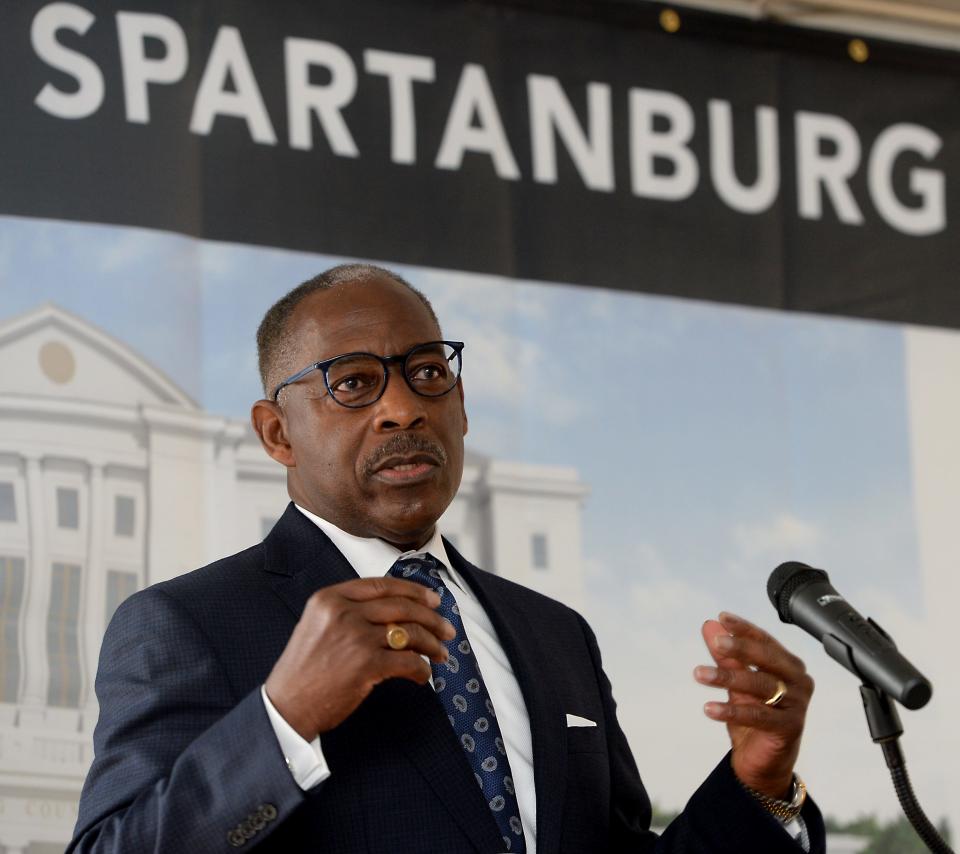Separation of powers or political gaslighting? SC's six-week abortion ban again in effect
- Oops!Something went wrong.Please try again later.
The all-male South Carolina Supreme Court reinstated the controversial six-week abortion Wednesday in a 4-1 ruling.
Justice John Kittredge, likely the next chief justice after a General Assembly vote next session, authored the majority opinion.
The majority, which also includes Greenville Judge Garrison Hill, said the court was convinced the General Assembly had a "compelling interest" in protecting "the unborn."
But the sole dissenting voice, current Chief Justice Donald Beatty, a Spartanburg native, referred to the legislature's actions as "the quintessential example of political gaslighting. He wrote in his dissent the decision attempted to "manipulate public opinion and control the reproductive health decisions of women by distorting reality."
In their majority ruling, justices rejected the notion that the 2023 fetal heartbeat law was similar to the 2021 law they tossed out earlier this year.
They indicated they were satisfied by the tweaks the legislature made. The new law, they argued, still gave a woman "informed choice," placing weight on the idea that a woman can know she's pregnant using at-home tests within seven to 14 days of conception. The judges wrote she would have "several weeks" after that to make her decision and have an abortion if she chose.

This implies that a woman should be checking for pregnancy every time she has sex. However, the majority indicated they are not concerned with that.
"To be clear, our decision today is in no way intended to denigrate or exalt any of the valid concerns on eitherside of the abortion debate, whether those concerns are based in privacy, morality, medicine, religion, bodily autonomy, or something else," the majority opinion said. The court said it chose to respect "the separation of powers" and "limited (non-policy) role of the Court."
Siding with medical professionals, Beatty said "six-weeks" as a benchmark did not follow scientific advice.
Beatty wrote that medical professionals classify six weeks of gestation as the "embryonic stage of development, not fetal" and the only "cardiac activity" are electrical impulses from the cells, adding that a "fetal heart," capable of "contraction," as provided in the statutory language, does not exist until later in the pregnancy, when the chambers of the heart have fully developed.
Beatty, on track to retire next year, said he was concerned about the majority's reluctance discuss the "fetal heartbeat" conundrum and "saving the debate for another day."
This presents a big problem, he wrote. How can lawyers advise their clients who might face criminal penalties if the law itself is not clear on the "fetal heartbeat" terminology? Could it be because the majority could not agree upon a threshold?
"In the interest of unity," the majority postponed a decision on this problematic issue in order to reach its desired consensus," Beatty wrote.
How did we get here?
After the U.S. Supreme Court overturned Roe v. Wade last year, it gave states the space to review their constitutions and decide whether abortion rights were enshrined or not.
The SC legislature worked overtime to pass a new near-total abortion law. Meanwhile, the courts meditated over the 2021 six-week abortion law. In January, the S.C. Supreme Court deemed the 2021 law unconstitutional. The majority was authored by the only female justice on the bench, Justice Kaye Hearn.
Things quickly changed after the January ruling.
Lawmakers, stunned by the state supreme court ruling, voted to elect Greenville Judge Gary Hill to replace Hearn. For the first time in over two decades, the SC High Court has no woman on the bench.
The Senate and House tried to pass two separate abortion bans. The bills did not take the regular committee route, indicating the leadership's unrelenting mission to pass some version of a ban. The Senate also resisted calls for a referendum to make abortion a ballot box issue.
Ultimately, only the six-week abortion ban prevailed and was later signed by Gov. Henry McMaster behind closed doors.
Senate Republicans and McMaster were jubilant Wednesday.
"The Supreme Court's ruling marks a historic moment in our state's history and is the culmination of years of hard work and determination by so many in our state to ensure that the sanctity of life is protected," McMaster said. "With this victory, we protect the lives of countless unborn children and reaffirm South Carolina's place as one of the most pro-life states in America."
Democrats said they were not giving up the fight.
“As a woman, I understand firsthand how devastating this decision is for us," South Carolina Democratic Party Chair Christale Spain said in a press statement.
"My heart breaks for the women who will be denied health care, for the women who can’t afford to travel out of state to get the health care they need, and for the families who have once again had a vital freedom ripped away from them because of dangerous Republicans who care more about controlling women’s bodies than delivering for our hard working families."
The two sides will see each other at the ballot box, she said.
Devyani Chhetri covers SC politics for the Greenville News. You can reach her at dchhetri@gannett.com or @ChhetriDevyani on X.
This article originally appeared on Greenville News: An all-male SC Supreme Court put a six-week abortion ban into effect

